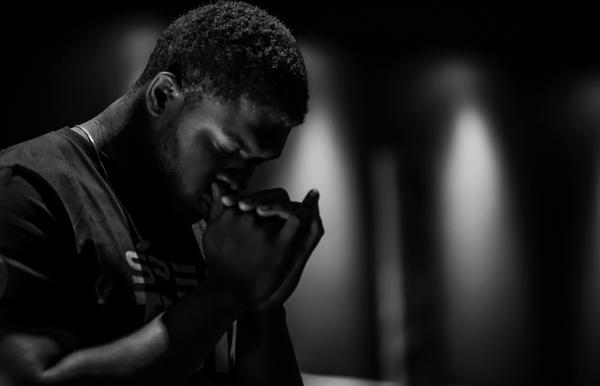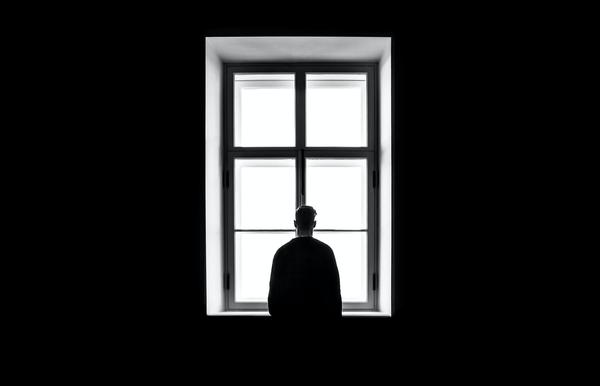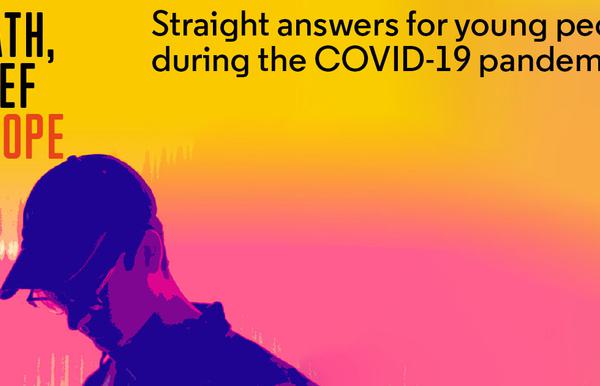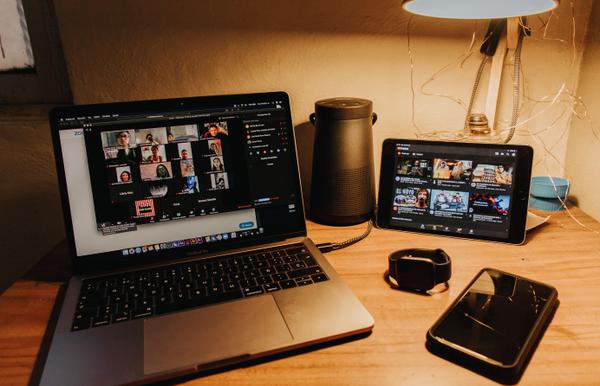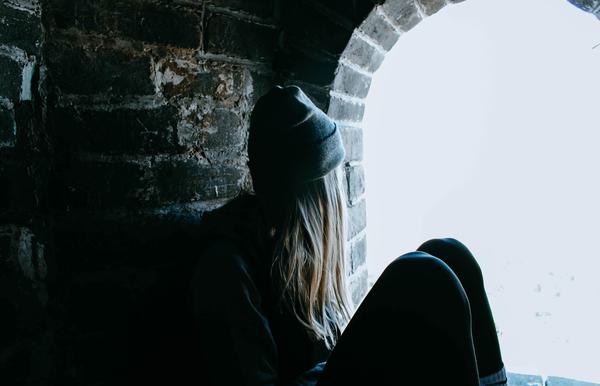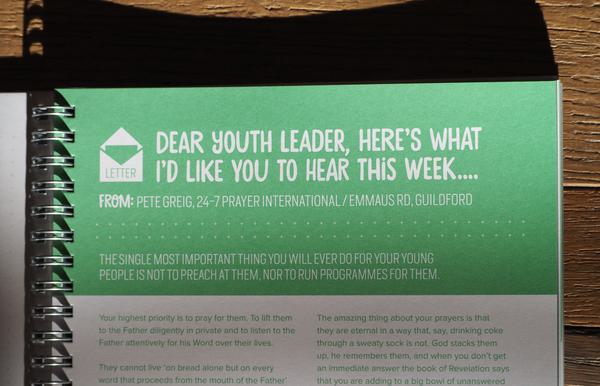We ran this liveblog from March to May 2020 to help youth leaders respond to the Covid-19 pandemic. All the content shared can still be accessed and searched for via the sidebar.
SOME HIGHLIGHTS FROM THE LIVEBLOG ARCHIVE:
Topic: Research
There are 0 new posts since the page loaded. Refresh
Resource Hub: New home for Coronavirus content
If you're looking for the latest blogs, research, and resources related to youth work and Covid-19, we've made a new home for that content with out Resource Hub, which you can find at the adjacent link. So no more updates on here, but do join us over there!
The Monday Report: Gratitude, overwhelm, and unexpected positives of lockdown
Last week we asked you some questions for the Thursday 3x3 - a way to take the temperature of the youth ministry community during the Coronavirus pandemic. Every Thursday at 3pm we ask three questions that will take you no more than three minutes to answer. We had 28 responses so this is not a representative group and we can’t generalise from these answers to all Christian youth workers in the UK. This week we asked about how you’re feeling, lockdown guidance and positive experiences of youth ministry.
You can read the full report here.
1. STILL GRATEFUL, STILL OVERWHELMED
This is the third (and final) time we’ve asked about how you’ve been feeling over the last week. We’ve asked the same question in week one (n=60) week five (n=53) and now week ten (n=28). With half-term in full swing and many youth workers furloughed, we had fewer people fill out this third survey but there is still some real consistency around the emotional experiences of feeling grateful and feeling overwhelmed. We know practising gratitude is powerful, but how do you manage moments of feeling overwhelmed? Here’s a great article from Dr Kate Middleton on overwhelm and some encouragement from one youth worker to another in a recent blog post for Youthwork News by Gemma Milligan.
2. LOCKDOWN
In week three we asked whether young people were following social distancing guidelines and (as far as you knew) the majority of you said yes. Now that we all have permission to meet in small groups outside, we wanted to come back to the question. This time we asked which of the statements below you agreed with. Given that youth work is not generally face to face, it is interesting that 30% have explained the guidelines and 85% have encouraged young people to stick to them. 41% have witnessed young people they know not following the guidelines, some of whom have been struggling with anxiety. But, as someone pointed out in a comment, we neglected to ask whether you had seen young people followingthe guidelines! In fact, where people made comments it was generally to tell us about young people’s compliance, or their frustration at friends who weren’t complying.

3. THE UNEXPECTED POSITIVES
We would never choose them, but these experiences of crisis can sometimes precipitate welcome change in ourselves and others. So finally, we asked ‘Has lockdown had any positive impact for your work with young people?’ There were a range of responses, but here (in order of frequency reported) are the key areas where you’ve seen good developments.
- More meaningful contact with young people. Some people have supported more young people through lockdown, but for most it has been about smaller groups, more focused conversation, space to talk about feelings, the chance to offer pastoral care or just the opportunity to develop closer relationships with specific individuals.
- More creativity in your approach to youth work. You told us about diversifying your programmes, doing more one-to-one engagement, doorstep deliveries, art-based work and even being able to use WhatsApp - despite previous resistance to the idea.
- Deeper faith development. Some people have noticed young peoples’ faith developing through a renewed focus on God or scripture within group settings. Others described young people being more vulnerable, more supportive of peers or whose faith was flourishing where they were taking more responsibility in a group.
- Other answers. Finally, there were other positives that you told us about: more meaningful contact with the parents of young people; the chance to slow down and read; more contact between young people themselves; opportunities to just have fun; group exercise and even appearances on a Sunday.
The Thursday 3x3
The Thursday 3x3 is a chance for us to ask Christian youth workers in the UK about their experiences during lockdown. If that’s you, step right up. Every Thursday at 3pm we’ll ask three questions about you, young people and youth ministry, which should take you about three minutes to answer. Today we’re asking (again) how you’ve been feeling this week, any positive impact of lockdown, and your experience of social distancing guidelines and young people.
This micro-survey is anonymous and the answers will be used to write a short report, which you can read on our blog next Monday. You can find the results of last week's survey here.
The Monday Report: Lockdown creativity, half-term breaks & youth worker encouragement
Last week we asked you some questions for the Thursday 3x3 - a way to take the temperature of the youth ministry community during the Coronavirus pandemic. Every Thursday at 3pm we ask three questions which will take you no more than three minutes to answer. We had 34 responses and this is not a representative group, so we can’t generalise from these answers to all Christian youth workers in the UK.
You can read the full report here.
1. Lockdown creativity: Treehouses, knitting and TikTok
For many people, lockdown has created the conditions to take up new hobbies or uncover buried creativity. So, we asked ‘Have young people you know been engaging in any creative activities to keep themselves occupied during lockdown?’ Three quarters said ‘Yes’, and 24 provided examples including: baking, painting, construction, journaling, making music, mindful colouring, writing, designing, knitting, gardening, making YouTube videos, learning musical instruments, mini artworks, stop-motion, woodwork, photography and coding.
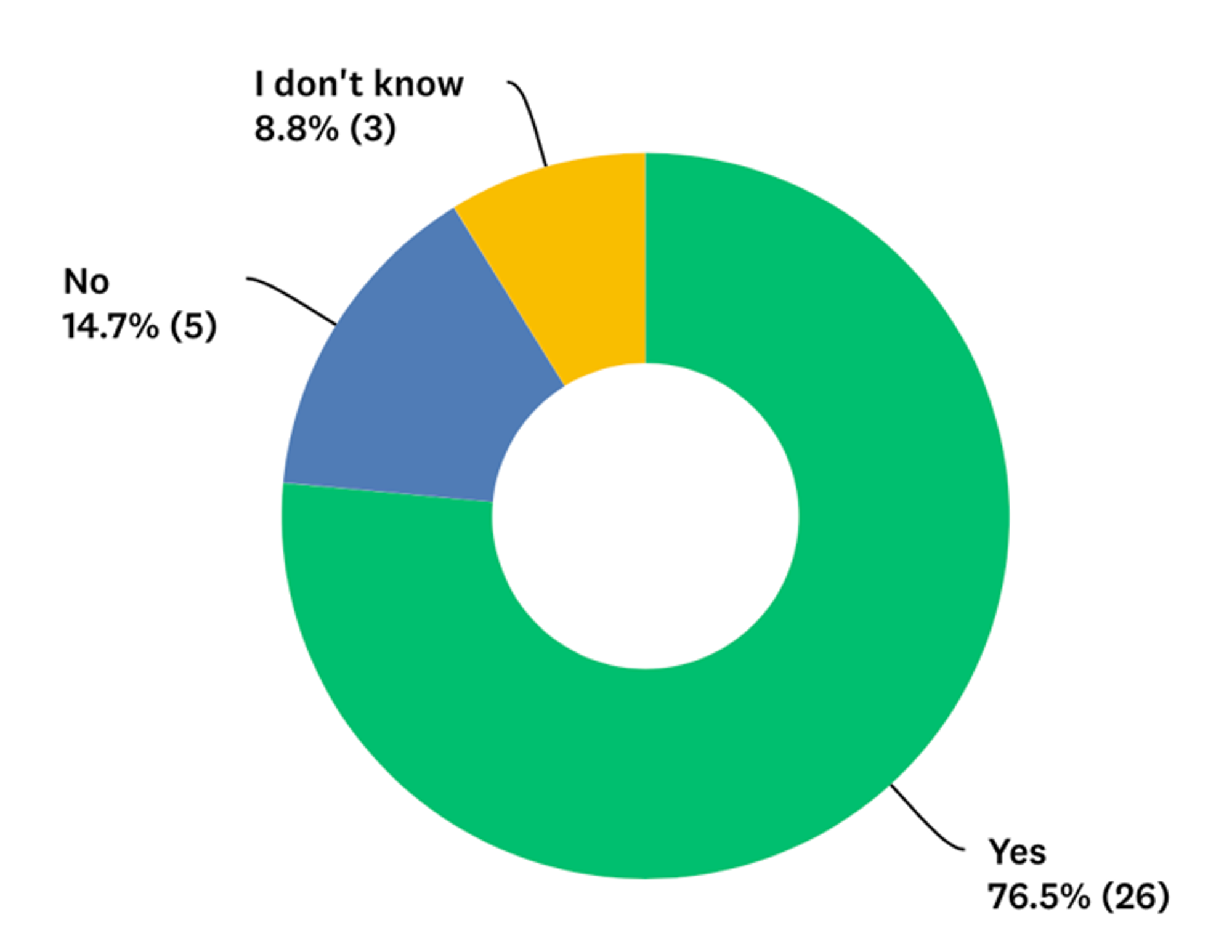
2. Half-term breaks?
At Easter time we asked you if you expected to slow down for the break and it was a really mixed bag. So, with another break upon us* we asked, “Are you stopping youth work activities over half term?” The majority (64.7%) aren’t stopping, although 14.7% of these are doing something a bit different this week. Just under a quarter are taking a break because that’s what they would normally do while 8.8% wouldn’t usually stop but sense the need for a break.
Of those who arestopping, many told us they are feeling tired. Some people pushed on through Easter but are stopping now, and some told us that they felt young people needed a break too. Some of those who are carrying on told us that young people and their parents still valued ‘meeting up’, and though they would usually stop they feel the need to “continue with our new normal”. One person reflected that “It seems like an opportunity missed if we stop for half term.”
3. Words of encouragement from one youth worker to another
Finally, as we enter week 10 of lockdown, it felt like a good moment to ask you, in one sentence, what other Christian youth workers might need to hear this week. We had a lovely message in there from a church leader who said “Take a day or two off. We love you and appreciate what you are still doing. Thanks for learning new skills and using them before you were probably ready.” I’ve summarised the key messages that were shared, with an example under each heading. Thank you so much for your contributions – I hope they encourage and affirm you!
What you are doing is important – “You are providing something stable and certain to young people when there seems very little certainty and everything keeps changing for them. Don’t underestimate the value of this.”
Just stay connected to young people – “Simply maintaining connection to the young people is the key thing at the moment; deeper conversations, teaching and spiritual formation may have to wait for now - and that's okay.”
Don’t judge yourself – “Don't make judgements on your calling or how good a youth worker you are. You're doing your best, this is not a fair time of evaluation for you or the young people.”
You’re not alone – “Feel unproductive, guilty about not doing enough but still being fully paid. You're not alone.”
You have limits, you will need to rest – “A youth worker’s job is never done. Log off and go outside…”
And when you reach the edge of what you can do, God is present, powerful and at work – “If you are finding it tough to engage young people over technology, you are not alone. And it doesn’t mean God has stopped working with them.”
Look up – what is God doing? – “Resist the urge to go back to normal. What is the new landscape God is helping you see?”
Don’t give up – “Keep going! It's tough I get it, but God is at work and doing so much more than you can see.”
God is with you - “Oh, God is just rejoicing over you. He loves you so much.”
The Thursday 3x3 (Week 9)
After a pause last week while we launched ‘We do God’, we’re back with the Thursday 3x3! It’s a chance for us to ask Christian youth workers in the UK about their experiences during lockdown. If that’s you, step right up. Every Thursday at 3pm we’ll ask three questions about you, young people and youth ministry, which should take you about three minutes to answer. Today we’re asking about half-term, creativity and your message to other youth workers.
This micro-survey is anonymous, and the answers will be used to write a short report which you can read on our blog next Monday.
Compassion and determination: the essentiality of youth work in a post-coronavirus world
There's a new blog post at Youth Work News from our Engagement Manager Gemma Milligan, drawing on this article from The Guardian.
"Despite huge funding cuts, little resources, and basically no advocacy, youth workers are still fighting to help meet young people’s needs; many choosing to do so in a voluntary capacity too. And I have little doubt that this is something that our world will be forced to rely upon in the months to come...there are now 2 million more (and 3 million in total) vulnerable young people in England due to this pandemic. That's huge. If there was a colossal need before it has now been tripled, and schools, mental health services, social care, and all other services that support young people, are going to be desperate for help to even begin to meet it."
Compassion and determination: the essentiality of youth work in a post-coronavirus world
‘Key work’ or not, youth work is essential not only for the millions of vulnerable young people in need, but for society as a whole. Can the government—and the church—recognise that?
A 3x3 holiday
It's been a busy week for the Research team! Our latest research report, We do God, has been released. It's all about youth ministry and spiritual practices, and you can read about it here (including free sample download), or purchase digital/hard copy versions of it here.
And Lucie Shuker tells us all about it in the latest podcast, too. Don't forget our Monday report on last week's 3x3 either.
All that is to say, there's much Research goodness for you to enjoy, but there's no Thursday 3x3 survey this week. Sorry. See you next week!
Podcast: We Do God with Dr Lucie Shuker
We’re creating a special series of the Youthscape podcast, which will continue to appear at semi-regular intervals during the current global crisis.
The latest edition has just gone live; in it, Martin meets returning guest Dr Lucie Shuker, Director of the Youthscape Centre for Research to explore the "We Do God" research and the implications for the youth ministry community.
You can listen now here, and subscribe to make sure you never miss an episode, here.
YS Special Edition 15: We Do God with Dr Lucie Shuker
Our newest research project, We Do God, is out now and Dr Lucie Shuker returns to the YS Podcast to discuss the findings in more depth.
The Monday Report: Faith at home, young people’s questions and lockdown practice
Last week we asked you some questions for the Thursday 3x3 - a way to take the temperature of the youth ministry community during the Coronavirus pandemic. Every Thursday at 3pm we ask three questions which will take you no more than three minutes to answer. We had 48 responses and this is not a representative group, so we can’t generalise from these answers to all Christian youth workers in the UK.
This is a short summary of the Monday report. Head here to see the extended results.
1. Faith at home – it’s a bit of a blur
A couple of weeks ago the Church of England launched their Faith at Home initiative. We were curious about your perceptions of faith in the home, and how it might be affected by these circumstances. So, we asked ‘Do you think young people are experiencing more spiritual conversation/spiritual support from parents in the home since lockdown?’
The largest group (41%) said ‘I don’t know’ - which makes sense. Unless young people or parents tell you about conversations they are having, youth workers won’t really know what’s going on at home. Nevertheless 27% said ‘No’, with some commenting that young people were more likely to be getting hassled from parents, or that not many parents had the resources or capacity at the moment. 22% said ‘Yes’ and the final 10% commented that some young people were experiencing more spiritual support from parents and some weren’t, but that it depended on the parents themselves.
2. Definitely Some Questions Asked
You might know that we did a piece of research a couple of years ago about young people’s questions about faith and God. Having been thrown into such an unusual situation, we wondered whether lockdown had triggered any particular reflections or questions on faith from young people. Just over a third of the comments were some version of ‘No’, with little extra commentary.
The other two-thirds had observed reflections or questions from young people, and they ranged in theme. Some young people had questions about suffering, while others were about the role and mission of the church in these times. Some young people were asking about what the future might be like, about injustice, heaven and their own busyness. Young people have been reflecting on “what is important in life”, “how we are reacting to different aspects of lockdown”, “the importance of real-life friendships”, “developing a personal rather than collective faith” and feeling generally grateful for what they have, according to these youth workers.
3. Lockdown practice: less singing but more celebration
Finally, this is the week when we launch our latest piece of research, We do God, exploring the role of Christian practices in missional youth work. Given that life looks so different for us now than it did a few months ago, we asked one of our survey questions again. Have you been intentionally practising any of the following in the last six weeks?
Most of the top five are the same as they were six months ago, but taking the place of worship here is celebration. Are we making more of the celebrations happening anyway (like birthdays or Easter) or are we celebrating more? Previous surveys have certainly picked up a strong sense of ongoing gratitude, and this may well be related to the practice of celebration – even in these challenging times. There has also been an increase in the practices of lament, living simply and rest. But don’t worry. in case you’re thinking we’ve all gone mega holy, fasting is still down at the bottom of the list…
The Monday Report: Faith at home, young people’s questions and lockdown practice
Head of Research Lucie Shuker breaks down the results of our new weekly survey designed to hear how youth leaders are doing in the midst of COVID-19.
"We Do God" launch
Check out the video of Dr Lucie Shuker below, here to tell you about the launch of our newest research report, "We do God".
"Youth workers know how to create an experience: whether it’s choosing the right music, taking young people to new places or creating some ritual that only your youth group will ever understand. But when it comes to faith, much of church culture focuses on learning about ideas rather than direct practice.
This new report from the Youthscape Centre for Research highlights the experiences of youth workers who invite young people within and beyond the church to experiment with Christian faith. Through case studies, interviews and survey data we identify which practices are being used and what people are learning about practice-based ministry."
We'll be going live on our Facebook on Tuesday 12th May at 11am to unpack the findings and apply it to the current context we're living in. Don't miss it! You can pre-order the hard copy of the report here, and a digital download will be available for purchase (alongside a free sample download) upon release.
The Monday Report: Youth worker as key workers, post-lockdown support and shifts in online engagement
Last week we asked you some questions for the Thursday 3x3 - a way to take the temperature of the youth ministry community during the Coronavirus pandemic. Every Thursday at 3pm we ask three questions which will take you no more than three minutes to answer. We had 57 responses, and this is not a representative group, so we can’t generalise from these answers to all Christian youth workers in the UK.
This is a short summary of the Monday report. Head here to see the extended results.
1. TWO-THIRDS THINK YOUTH WORKERS SHOULD BE KEY WORKERS
Last week the National Youth Agency called for youth workers to be considered as ‘essential key workers’ so that they can continue to provide some face-to-face support to young people. We asked whether you agreed. Two-thirds said ‘yes’, a fifth said ‘no’ and the rest said they didn’t know. Respondents pointed out that that youth workers could be a lifeline for vulnerable young people who would otherwise fall through the gaps, but some people were concerned about physical distancing and didn’t see their work as equivalent to other essential services.

2. WE WANT SUPPORT FOR THINKING ABOUT YOUTH WORK POST-LOCKDOWN
Youth work organisations have rallied quickly to provide support, resources and guidance during lockdown, but it’s hard to know what people find useful. So, we asked ‘What support would you find helpful from youthwork organisations?’ 64% wanted guidance or advice on youthwork after lockdown, compared to 39% wanting advice about youth work during lockdown – suggesting that there is a need to prepare for how we’ll manage in the next phase. There is a desire for ‘general encouragement’ (52%), but fewer people want to engage in discussion with other youth workers (30%). Finally, it’s encouraging to see just over half the group have an appetite for ‘new models or approaches to youthwork’ (52%), as well as ‘session plans for online youth work’ (50%). Other suggestions were ideas for ‘all-age slots’ at online church, how to keep connected over a sustained period of lockdown, mental health resources to support young people/youth workers and, uhm, gardening tuition online…
2. A CORE GROUP ARE SHOWING UP ONLINE, BUT SOME ARE STILL MISSING
This week we asked, ‘How are young people engaging with online activity you are offering in week six, and how does this compare to the earlier weeks of lockdown?’. Just over half the answers (54%) were positive, describing a core group of young people engaging fairly consistently with online activities. While some people were effusive about online work, others were struggling. One person said that young people were still engaging well but “It’s getting harder and harder to keep it fresh and almost impossible to really connect with them through it”. And a number of people also said that although engagement has been stable, there has always been a group of young people who never showed up in the first place.
“We have the same group of young people each time we do a zoom chat. They are keen, but the rest of the group haven’t yet engaged.”
Finally, eight people told us that young people were not engaging with online activities at all, or much less than they had been. This was ascribed to weariness with Zoom, the burden of schoolwork, the novelty having worn off and having to manage home life. It’s important to remember that we don’t know the context behind these comments or numbers and it’s probably too soon to understand why things work well in some places/moments and less well in others. Whatever your experience, your desire to support young people comes through loud and clear. Keep going!
The Thursday 3x3
3 MINUTES, 3 QUESTIONS, EVERY THURSDAY AT 3 O'CLOCK
The Thursday 3x3 is a chance for us to ask Christian youth workers in the UK about lockdown. If that’s you, step right up. Every Thursday at 3pm we’ll ask three questions about you, young people and youth ministry, which should take you about three minutes to answer. Today we’re asking whether you think youth work is an essential service, whether you are noticing any changes in young people’s digital engagement and exploring what you feel you need right now.
This micro-survey is anonymous and the answers will be used to write a short report, which you can read on our blog next Monday.
New blog post: The Psychological Aftermath of Quarantine
What impact could this period of quarantine have on our mental health, and the mental health of the young people we work with? As a Church, what could we be doing to prepare? Gry Apeland explores this in a new Research News blog post:
"What we might need to prepare for instead is to walk slowly with our young people, as we take the first feeble steps together back into what we used to call ‘normal’. Does a group of 20 feel scary? Let’s start with five. Some of us could come out with long-lasting psychological symptoms – let’s have patience for each other. Let’s create a space for young people where it is safe to process this experience, even long after it is over."
The Psychological Aftermath of Quarantine
Gry Apeland reflects on the impact quarantine could have on our collective mental health, and how we can we prepare.
Out of Sight? - National Youth Agency Report
If you're concerned about the vulnerable young people in your community, we recommend reading the new report released today by the National Youth Agency. It draws attention to the pressing needs many young people are facing as a result of the pandemic and calls for a clear exit strategy for young people who are likely to be included in the early stages of release from lockdown measures.
The top-three concerns (found in the report) are:
- ‘Increased mental health problems’: Over a million young people have self-reported mental health issues. There is a spike in calls to Help Lines, with 84% reporting worse mental health following school closures or being no longer able to access mental health support
- ‘Missing from education’: With schools only partially open and youth centres closed, as few as 5% of young people are currently engaged in school and have limited or no access to youth work. Even when schools re-open there are 700,000 young people persistently absent or NEET (not in education, employment or training)
- ‘At risk, at home’: Over a million young people are at risk from any of the so-called ‘toxic trio’ of addiction, mental health, and domestic abuse. Despite this, child protection referrals have plummeted by 50% in some areas.
You can read more and download the full report here.

The Monday Report: Gratefulness, gender and good music
Last week we asked you some questions for the Thursday 3x3 - a way to take the temperature of the youth ministry community during the Coronavirus pandemic. Every Thursday at 3pm we ask three questions which will take you no more than three minutes to answer. We had 50 responses, and this is not a representative group, so we can’t generalise from these answers to all Christian youth workers in the UK.
This is a short summary of the Monday report. Head here to see the extended results.
1. WE'RE FEELING GRATEFUL, BUT MORE CONCERNED AND LESS OPTIMISTIC
At the end of the first week of lockdown, we asked youth workers to identify up to three feelings they had been experiencing most often. The top three were "overwhelmed’, ‘optimistic’ and ‘thankful".
We repeated the question last week, and ‘thankful’ had jumped to the top of the list, chosen by 44% of the group. Being thankful is a spiritual practice that is particularly important for sustaining mental health during challenging circumstances, and has been shown to be associated with enhanced well-being in numerous studies as well. Coming in second was ‘overwhelmed’ at 34%, and behind that was ‘concerned’ at 30%, which has doubled from 15% in Week 1. Optimism is still present, with 20% highlighting this as one of their top three emotions of the last week – but much lower than the 38% of Week 1.

2. GENDER AND LOCKDOWN: HOW ARE YOUNG PEOPLE RESPONDING?
We asked whether you’d noticed any differences in how young people are managing in lock-down, depending on their gender. First, the caveat. These are perceived differences, so we’re not saying that they are real or true for all young people. Indeed, 14 people said they hadn’t noticed any particular patterns related to gender.
Where differences were described, some were related to perceived patterns of communication: girls are talking to their friends more, while were boys are connecting over gaming. Some saw girls as being more willing than boys to seek support early in the lockdown, while boys appeared to be ‘ok’. For some, this is reversing and girls engagement is trailing off as they find their feet, while boys are now more likely to reach out for support
Boys were perceived to be feeling the absence of sport and physical activity outside, with some youth workers describing young men as being less engaged with video calls than young women. A few people mentioned that girls appeared highly invested in doing well in their education while boys seemed more laid-back in this regard. Finally, there were references to boys feeling bored (and some becoming frustrated and angry), while girls appeared more likely to be independently occupying themselves.
What do we make of this? Well, while gender is likely to be a factor affecting how young people cope with and experience lockdown, it is just one of many. This small sample won’t give us answers but might create the opportunity for you to reflect on your own context and what you have noticed. Do young men and women have different needs at this time? How are we likely to perceive them, and how might that affect what we observe?
These answers just raise more questions, don’t they?
3. GIRL (AND BOY) PUT YOUR RECORDS ON
Finally, we asked, "If you could contribute one song to the ultimate lockdown playlist to lift other youth workers' spirits, what would it be?" Half of you went for worship songs and the rest for your favourite uplifting tunes (there are some truly amazing choices in there). So, we’ve made two playlists for you. Enjoy!
THE SONGS:
THE WORSHIP SONGS:
Liveblog: midweek round-up
Welcome back to the mid-week round-up – bringing you liveblog highlights from the last seven days just in case there’s anything you’ve missed.
- We’re a few weeks into lockdown and the exhaustion of constant video calls is starting to take hold. Will Van Der Hart from the Mind and Soul Foundation articulated what so many of us are feeling his recent blog post ‘Telephone Empathy’. The article is full of insights and reflections on the exhaustion of video calls. There’s also a load of useful tips which are beneficial for youth leaders to read through and to recommend to any young people who are struggling with the beginnings of digital burnout.
- The theme of being tired of life online continued in Youthscape Podcast Special #10 where Martin and Rachel discuss ‘screen fatigue’ and how young people might try and reclaim online spaces.
- Many new resources appeared on the blog this week from several different organisations covering a variety of topics. While only a few are highlighted here, it is definitely worth scrolling through the blog to see what other excellent resources have been posted. Church Army has created a booklet titled: "Death, grief and hope", aimed at helping support young people during Covid-19. Premier Youth and Children's Work have published a really helpful article, by Mark Arnold, about how to help children/young people with additional needs to understand Coronavirus. Lastly, Youthscape released the final session in the online Together Apart series. All sessions are still available on the liveblog and provide comprehensive session plans to enable youth leaders to run a traditional youth group model online.
- Youthscape's Head of Theology, Dr Phoebe Hill, has written a blog exploring the dangers of "theologising" a crisis. The blog is inspired by a current area of research into theological reflections in youth ministry. The research team is asking for youth leaders – both employed and voluntary – to join with them on this project by filling in a survey. By taking the time to complete the survey you’ll also be in with a chance of winning a £100 voucher!
- The weekly Monday report summarised the discoveries of the Thursday 3x3 and provided insights into what youth workers are seeing and experiencing in relational to quarantine struggles, online church and life after lockdown. Please join us on 3pm each Thursday and spend 3 minutes answering 3 questions to help give us a greater understanding of what life is like for youth leaders and young people around the country at this time.
As always, we want to thank you so much for your support and if there’s something you’d love to see or even something you want to contribute in coming weeks please get in touch!
The Story: Free poster 3 – ‘Everything you need to know about Losing Heart’
We’ve been rummaging around in the digital basement, and found some old posters from the first few editions of our research quarterly The Story, way back in the heady years of 2015 and 2016. We thought we’d share one a week with you, as a free download, in case you find yourself with a little more time for reflection and reading. If that’s not you, stick it in a file marked ‘Later’. You can download the poster as a PDF via the adjacent link.
As well as the information found in this poster, you can download the full Losing Heart report here. You can also find the other Story posters here and here.
We've also now released the spring edition of The Story: you can read it online here, or to get the full version in print, subscribe to The Story here.
The Story Poster 3: Losing Heart
A free downloadable PDF from our research quarterly The Story, on 'everything you need to know about Losing Heart'.
The Thursday 3x3
3 MINUTES, 3 QUESTIONS, EVERY THURSDAY AT 3 O'CLOCK
Yep, you read that right. Turns out that, neat though it is, Friday at 3pm is probably not the best time to ask you our three questions. The weekend is calling, you’re winding down, and you are not ritualistically checking our blog. So, from now on, it’s the Thursday 3x3.
If you’re new to this we thought it might be important to capture some of what this glorious community is doing, thinking and feeling during an entirely new experience. But things are changing so rapidly we didn’t want to just ask once. Every Thursday at 3pm we’ll ask three questions which should take you about three minutes to answer.
Today we’re asking about what young people are struggling with, and what you want to hold onto, post-pandemic.
Come back to the blog next week for results in our Monday Report.
New blog post: Is it right to do theology in the midst of a crisis?
Many of us are searching for meaning in the midst of the Coronavirus pandemic, but is now the right time to try and "theologise"? Youthscape's Head of Theology Dr Phoebe Hill gives her thoughts in this blog post.
"There seems to be a very great difference between theology birthed from a crisis context, and theology actually carried out while the theologian herself is in the midst of crisis."
Is it right to do theology in the midst of crisis? Reflecting on theological reflection
Head of Theology Phoebe Hill explores the dangers of "theologising" a crisis.
Liveblog: midweek round-up
Things have been a little quieter this week with the bank holidays on Friday and Monday and people taking time off to celebrate Easter. That being said there’s still been some great content on the liveblog and, like last week, we want to bring you the highlights of posts you might have missed:
- It’s been great to see whole organisations embrace life online and so encouraging to see both Princeton Theological Seminary and The National Youth Agency bring events and training on to a digital platform. On Wednesday 29th April, Princeton Theological Seminary's Institute for Youth Ministry is running a Digital Forum on Youth Ministry titled "Revisioning Youth Ministry: Failure, Grief, and Hope". This is set to be an informative and engaging event designed to bring support and encouragement to youth leaders on a personal level, as well as in a professional capacity, as they seek to minister to young people during this challenging time. Before then, The National Youth Agency is holding a free webinar over Zoom about how to do detached youth work during Covid-19. The event takes place this Friday, 17th April, from 2-3pm.
- Unfortunately, several Christian conferences have had to cancel this year due to the current circumstances. However, Spring Harvest Festival have put together a completely free, online Christian conference, available for anyone via their Youtube channel. There are talks, devotionals and worship all around the theme of “Unleashed – The Acts Church Today" and it’s definitely worth checking out.
- Dr Lucie Shuker, Director of the Youthscape Centre for Research, released a very interesting Monday Report which examined youth leaders’ responses to questions about flouting, furlough and finding new connections. The research team are doing weekly 3x3 questions (3 minutes, 3 questions, every week at 3 o'clock) and your input in those surveys is greatly appreciated. We've changed the day to Thursday, to give you a bit more time! Find out more about this research in this week's podcast.
- We've released the latest in our "Together Apart: youth work online" series. We've been creating free, easy to use session plans for your youth work. Find the latest one here.
Again, we want to thank you so much for your support and if there’s something you’d love to see or even something you want to contribute in coming weeks please get in touch!




